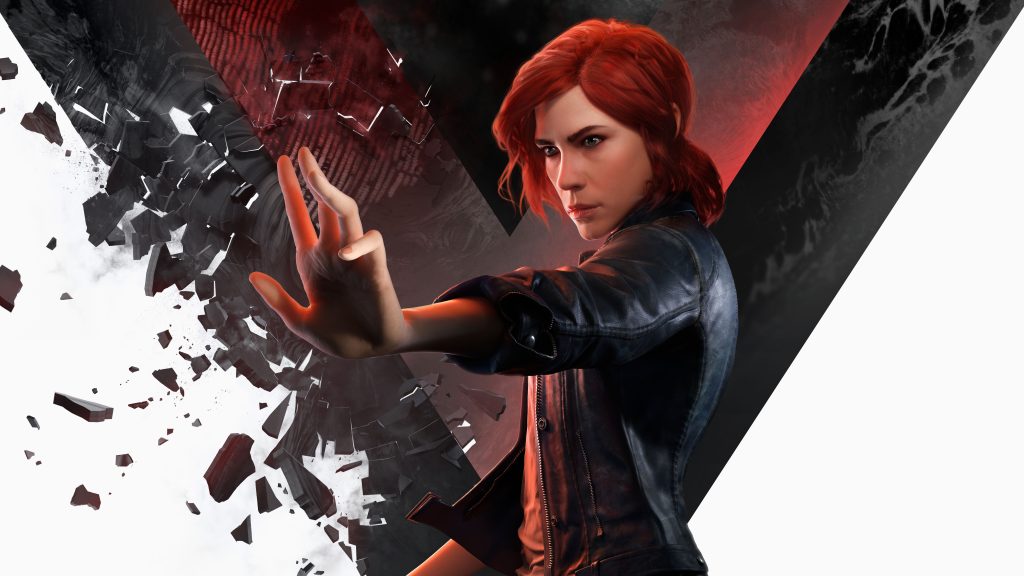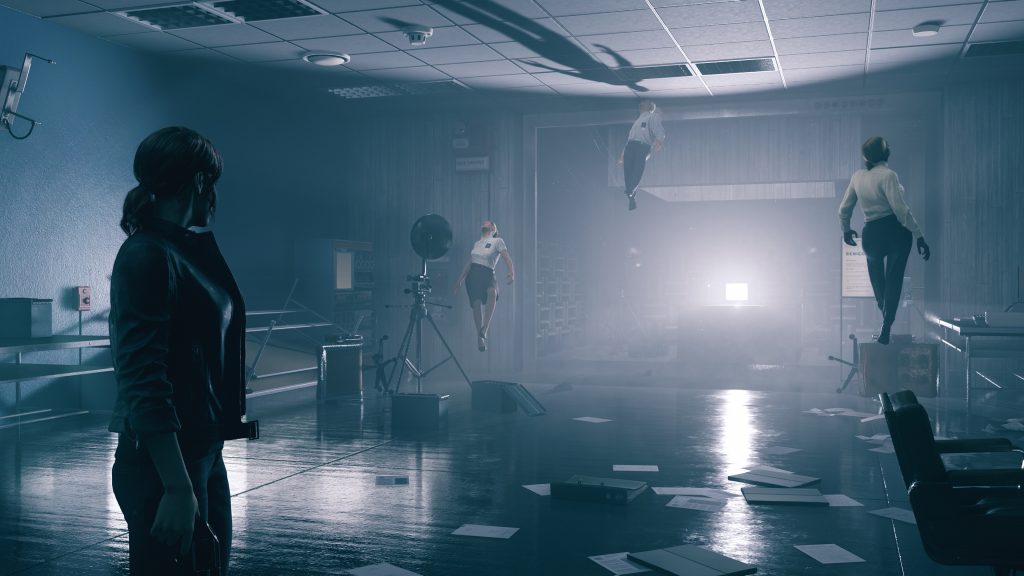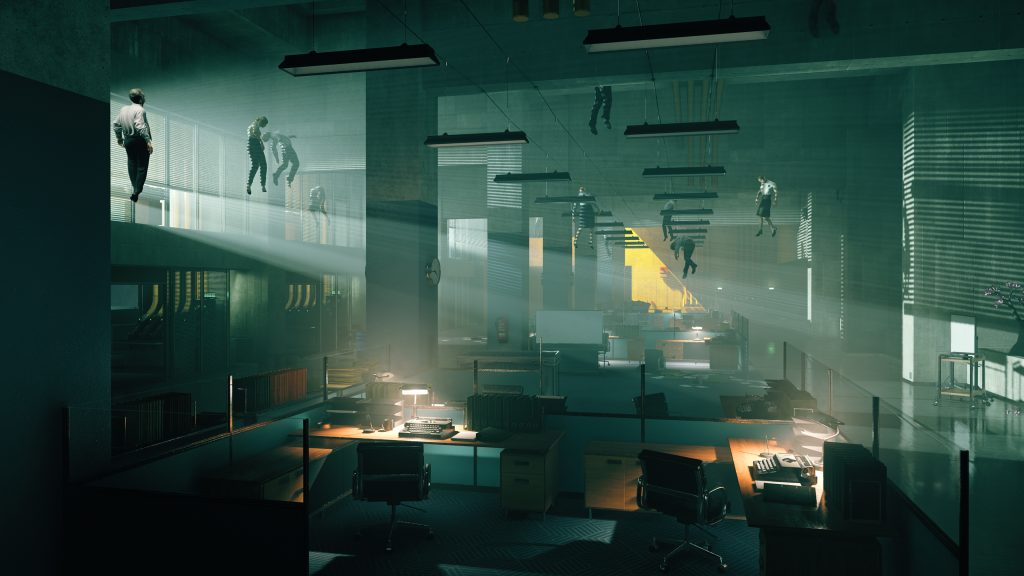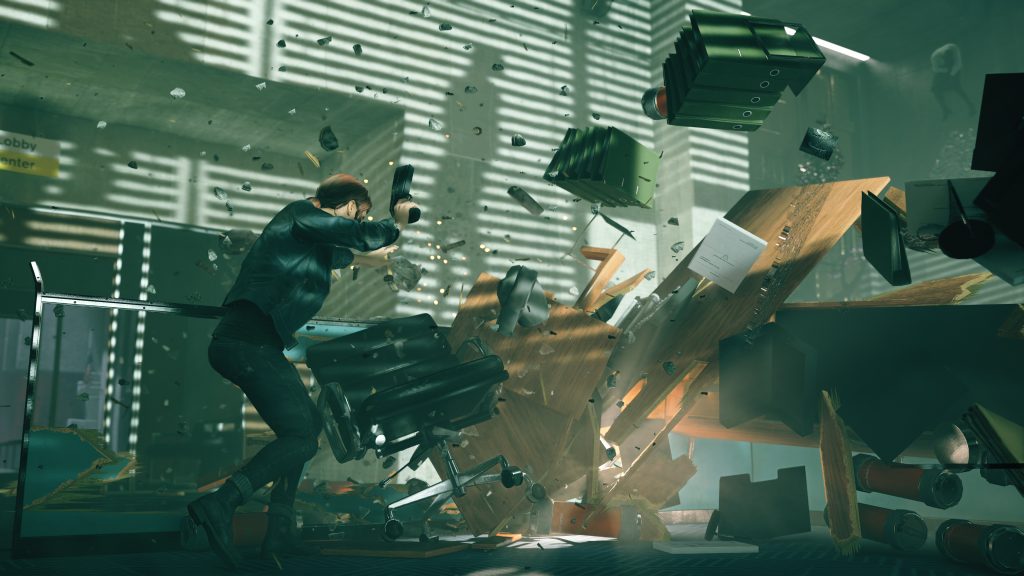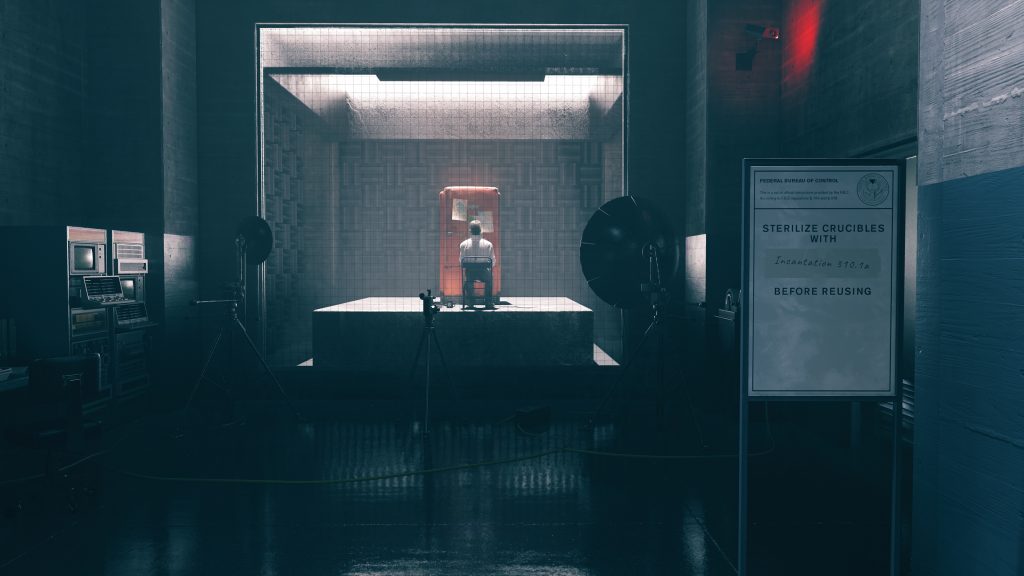Control is the next mind-bending sci-fi third-person shooter from Remedy, the studio behind Max Payne, Alan Wake, and Quantum Break. You play as Jesse Faden who, in the search for her long-lost brother, has been led to the United States Federal Bureau of Control by a mysterious voice in her mind. Shortly after arriving Jesse, without much of a say in the matter, becomes the bureau’s new Director and is tasked with bringing a stop to the interdimensional evil that has invaded.
The premise is immediately compelling. The Oldest House, as the bureau’s office is called, is fascinating to explore. Control utilises stark corporate environments, moody lighting, and bright colours to great effect, and the way rooms can be absolutely torn apart by bullets and explosions, a staple of Remedy’s games since the beginning, makes gunfights endlessly gratifying.
The Oldest House is warped and ever-changing, and its occupants are just as unpredictable. While on the surface the various departments of the bureau may look like offices, warehouses, labs, and so on, you can never really be sure what lies around the next corner. Control truly shines when it leans hard into the bizarre and nonsensical. Venturing into a whole department that had been closed down due to a literal flood of antique clocks, stumbling into a deserted road-side motel that acts as a gate from one end of the bureau to the other, or meeting with a man who’d been staring at a fridge for hours, terrified of what would happen if he looked away.
Jesse’s frank and perceptive internal monologues and her dialogue with others are believable and endearing for someone who’s seeing the otherworldly things she’s seeing. There are a number of friendly faces to meet, and while the characters themselves are fairly rote, they fulfill their role in the narrative well enough. The voice acting performances are decent, but the facial animation can be a little unsettling and stiff at times.
The Hiss is what Jesse dubs the insidious force that has taken over the bureau’s employees, turning them hostile and granting special powers. Thankfully, as Director, Jesse gets special weaponry and powers of her own. The first of which is the Service Weapon, a gun that only the Director can wield which takes several different forms as you progress through the game. That’s right, in Control you technically only get one gun – it just has different ‘modes’ that serve as the familiar shooter archetypes. You start with Grip, which is essentially a handgun, but will soon unlock different staples like Shatter (shotgun), Spin (SMG), and Charge (long-range). You can only have two of these modes active at once, and they share ammo which recharges by itself over time.
Jesse is also endowed with telekinetic powers that allow her to throw objects, surround herself in a shield of rubble, force enemies to temporarily fight alongside her, and more. Picking up a chair, fire extinguisher, or even a forklift, having it whir in your ear as Jesse brings it towards her, then blasting it at a group of Hiss-infected guards is something that remained fun for the duration. As encounters become more difficult and enemy variants more complicated the combat turns into a balancing act of managing energy, the source of Jesse’s powers, and the ever-recharging ammo of the Service Weapon. This on-the-fly resource management is cleverly implemented and forced me to make use of all the tools at Jesse’s disposal during a fight. Going in guns blazing works to a point, but soon enemies will appear with shields that can only be damaged by telekinetically thrown objects, forcing you to adapt.
Control is a Metroidvania of sorts, with certain areas of The Oldest House being blocked off until you have the right ability or security access. This is certainly a departure for Remedy, but a welcome one. Progress is marked by claiming Control Points, which are checkpoints of sorts that double as your means of crafting and fast travel. When claiming one in a particularly distorted area, there’s a brief scene of everything returning to normal as the Hiss corruption fades, which provides a satisfying sense of progression as you take The Oldest House back, bit by bit.
A lot of the world-building and back story comes from the typical sources: collectible documents, cassette tapes, and instructional videos. The documents, in particular, are dreadfully dull as they’re mostly written as bureaucratic reports complete with black-bar redactions making them a chore to read. Then there’s Dr. Darling’s live-action, in-world videos which are charmingly acted and certainly more interesting, but they’re still not always worth stopping to watch. This speaks to the first of several Controls missteps, Remedy has crafted such a unique environment, and yet the incentives for exploration are rarely worth the effort.
During combat, the only way to heal is from pickups dropped by defeated enemies. In Control, there are no regenerating health or first aid kits you can stock up on in advance. This means that if you’re almost out of health in a fight your only option is to run out into the open and quickly try and find some health pickups before you get finished off. A risk/reward healing power would’ve fit in well here, but as it stands if you’re low on health and surrounded by enemies it may as well be a game over. Similarly frustrating, when you die you return to the last Control Point you interacted with, which makes returning to boss fights pointlessly arduous. Why it doesn’t autosave right outside boss arenas is beyond me.
Finally, and perhaps the biggest frustration of all is the map. Metroidvanias rely heavily on their maps being easy to read and use and unfortunately, the map in Control is neither of those things. Each department in Control has multiple floors but the map for each department only has one layer, meaning everything is sort of crisscrossing over everything else. You can’t switch between individual floors of an area, you can’t zoom in and you can’t see which rooms have undiscovered secrets or collectibles. Even just for a third-person shooter, the map is sub-par.
Despite these annoyances, Control is an admirably ambitious attempt from Remedy to try something a little further out of their wheelhouse. For the most part, Control is a solid third-person shooter with super gratifying combat that stands out thanks to its weird and wonderful backdrop. Unfortunately, the wackiness is often superficial. Reading the samey, redacted documents gets old fast and there’s often nothing more to glean from the bizarre stuff you come across, aside from the novelty of first coming across it. There’s a disconnect here between build-up and payoff, and I wish Remedy were better able to meld the kooky and strange with their characters and narrative.
Control is certainly full of surprises. While at the end of the day it’s still fundamentally just another third-person shooter, the freedom of movement and balance of the combat combined with the consistently unpredictable diversions is what elevates Control above its peers.
Rating: 8/10
Control was reviewed using a review code provided by the publisher.

